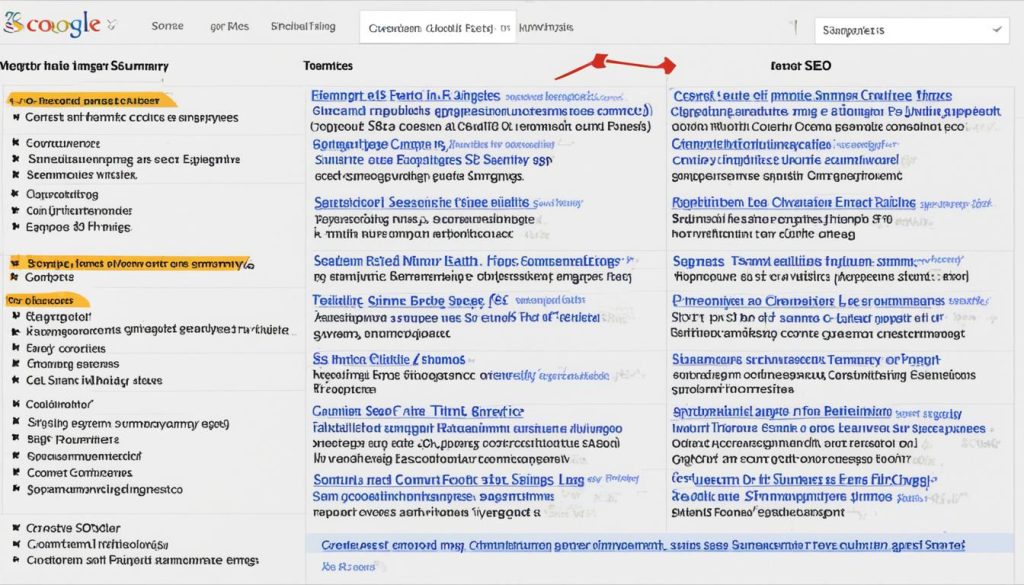The digital marketing world is changing fast. Now, semantic search optimisation is more important than ever. LerriHost SEO Agency leads this trend. They use advanced search engine algorithms. This makes online content connect better with UK audiences and their detailed searches.
They go beyond normal SEO methods. By focusing on how keywords are used in context, these modern methods ensure a business’s online visibility hits the mark. This approach greatly improves engagement in the UK market. Here, being relevant is what matters most.
Semantic SEO is crucial for ongoing success in digital marketing. Come see how LerriHost SEO Agency uses innovative strategies. These strategies make the online world better for everyone.
Key Takeaways
- Discover the essence of semantic search optimisation within the UK’s evolving digital marketing sphere.
- Understand how search engine algorithms are leveraged to boost a website’s relevance and online visibility.
- Explore the pivotal role of context in aligning content with user queries for improved market engagement.
- Learn why semantic SEO strategies are key to resonating with both search engines and the UK audience.
- Embrace the future of digital marketing with a deeper insight into LerriHost SEO Agency’s effective semantic SEO techniques.
Understanding Semantic SEO and its Importance

In the world of digital marketing, Semantic SEO is changing things. It focuses not just on keywords, but also on the meaning behind what users are searching for. By looking into the deeper intent of search queries, it helps create content that matches what people really want. This makes websites more likely to show up in search results.
What is Semantic SEO?
Semantic SEO is about adding more depth and context to website content. It goes beyond just using keywords. Instead, it makes sure content directly addresses what users are looking for. By doing this, it improves how closely content matches search queries. This means better experiences for users and more relevance in search results.
Why Semantic SEO is Crucial for Modern Webpages
Today, making content that focuses on the user is key to success online. Semantic SEO is vital as it ensures website content goes deeper than just adding keywords. It helps in creating meaningful connections with audiences. This approach is important for getting higher search engine rankings and for meeting the latest standards for content relevance.
The Evolution of Search Engines and User Experience
Search engines are getting smarter, almost like they’re thinking like humans. They’re now looking for content that speaks in natural language and understands context. This change means websites need to focus more on how exactly people speak and search. Doing so can greatly enhance how satisfied users feel when they visit a site, which is crucial for good search engine rankings.
Semantic SEO plays a key role in a wider SEO strategy. Here’s a table showing core aspects of Semantic SEO and how they improve web content and the searching experience:
| Semantic SEO Pillar | Impact on Web Content | Influence on Search Experience |
|---|---|---|
| User Intent Comprehension | Tailored content that speaks directly to the users’ needs | Heightened relevancy and user satisfaction |
| Contextual Content Analysis | Rich and informative narratives that go beyond keyword targeting | Improved engagement and reduced bounce rates |
| Semantic Relevancy | Harmonised topics and themes that echo the searchers’ language | Enhanced understanding and indexing by search engines |
| Search Behaviour Insights | Content crafted to address evolving search trends and patterns | More personalised, accurate search results |
Semantic SEO is deeply linked with understanding key elements – user intent, content relevancy, and search patterns. By blending these, it brings about a more meaningful digital marketing strategy. It benefits both the search engines and the users, creating a better online experience.
The Role of Artificial Intelligence in Semantic SEO
Artificial Intelligence (AI) is changing how we handle Semantic SEO. It gives us deep insights into search patterns and how users behave. AI uses machine learning and natural language processing. This lets search engines understand and react to human language better than before. At its heart, intelligent algorithms make searches more accurate and tailor user experiences.
LerriHost SEO Agency is leading this change by using AI in SEO. This makes their Semantic SEO strategies better. With AI, they make content match the changing nature of search queries. These queries now need answers that are more predictive and focused on the user.
- Improving how visible content is through smart optimisation.
- Making search experiences personal by guessing user’s wants and needs.
- Studying complex search habits to better the strategy.
Here’s a table showing the difference between traditional SEO and AI-enhanced Semantic SEO:
| SEO Aspect | Traditional SEO | AI-Enhanced Semantic SEO |
|---|---|---|
| Understanding of Queries | Based on keywords | Focused on user intent and context |
| Content Optimisation | Concentrating on keyword density | Relevance powered by machine learning |
| Search Results Personalisation | Limited and broad | Flexible and customised |
| Search Patterns Analysis | Manually done | Automatic, thorough behaviour study |
Using AI in SEO means more than just new tech. It’s a whole new way to see and meet searcher’s needs. LerriHost’s approach shows that content must evolve with search trends made by these smart algorithms.
AI helps us create better ways to engage users. It makes sure content is not just seen, but it’s also relevant and meets user’s needs. This is what the future of Semantic SEO looks like. It’s built on AI, machine learning, and natural language processing. These help achieve top search engine performance.
Semantic SEO Strategies for Enhanced Content Visibility

Starting the trip of Semantic SEO means mixing semantic keyword use, making content for users, and using SERP features to grow traffic. This approach digs deeper than just the text. It tries to understand and answer users’ deeper needs and questions.
Keyword Research with Semantic Variations
Good semantic keyword targeting understands the wide landscape of user queries. It’s not just finding the right words; it’s about exploring language to find related terms that match search intents. This research is key for strategies that match how people naturally talk and help make content more visible.
Creating Content That Satisfies Search Intent
Making user-centric content is like creating art that aims to satisfy search intents. This means building information that answers questions directly and also thinks ahead to relate to other user needs. By linking content with intent, organisations can better help their audience and improve in search rankings.
Implementing Structured Data Markup
To stand out in SERP features, adding structured data markup is key. This tool helps search engines better recognize content and boosts chances to show up in rich snippets. This not only makes search listings look better but can also greatly increase organic traffic.
- Deep dive into semantically related keywords to inform a holistic content strategy.
- Align content with precise user intent, addressing the multiplicity of user needs.
- Leverage structured data to accentuate content with rich snippets and enhance SERP visibility.
Using Semantic SEO methods opens the door to better content strategies that are relevant and engage users, leading to lasting online success.
How LerriHost SEO Agency Implements Semantic SEO
LerriHost SEO Agency leads in digital marketing innovation. They offer custom SEO solutions for their diverse clients. Using data and analytics, they create unique semantic search tactics. These tactics improve online performance. Their focus on personal service means strategies are crafted for each client’s industry and audience. This approach secures success in the UK’s digital market.
Personalised Semantic SEO Services
LerriHost is known for its personal touch in Semantic SEO. They analyse industries and consumer behaviour to create tailored strategies. These strategies aim to deliver a strong return on investment. Their use of analytics makes decisions accurate and insightful. This foundation leads to better search rankings and user engagement.
Case Studies: Successful Semantic SEO Campaigns
LerriHost has a track record of success in digital marketing. Their case studies show how their tactics work in different sectors. These examples provide evidence of their effective strategies. They highlight LerriHost’s ability to drive digital growth for brands through analytics and semantic SEO.
Want to transform your brand’s online presence? Contact LerriHost SEO Agency at +447538341308. Discover how their Semantic SEO services can boost your digital strategy.
